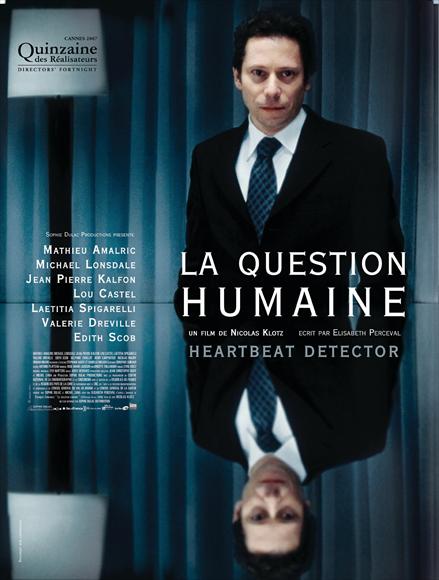It begins with Simon Kessler, the human resources psychologist, who is asked to get to better know his company's alcoholic and despondent CEO, Mathias Jüst -- to monitor his behavior and report back to Karl Rose, the vice president. Simon gets the novel idea to begin an orchestral program that was attempted a few years back with the goal of getting Jüst involved on his violin playing with any blue or white collar worker willing to be involved.
The film plummets some ground that hit me personally pretty hard. There's a political back text that becomes front and center in the film's second half that anyone who reviews the film will talk about, that of European disillusion even sixty years after WWII, and how corporations and their employees still have to stare those days in the face and work in the midst of it. I found that aspect interesting, very much so, but it's not what got my heart pumping. What got to me was director Nicolas Klotz's ability to place all forms of music in the heart of the film, a music we very quickly learn that neither Jüst nor Simon can relate to. Because they can't relate to much of anything or anyone, really. It's amazing how much communication it takes to put the right pieces in place to run a company, and how you can create wealth like moving chess pieces on a business platform -- you can seemingly have it all and still be an unrelatable miserable grouch who has slipped through the cracks -- you've forgotten the importance of breaking through your own isolated humanity, that it is misery to be trapped and alone, and yet even those in business at the top of their game can fall into this horrible life pattern.
Jüst cannot gain even a simple pleasure from listening to music he created in the past. He says it physically pains him, and we see it bring him to the point of tears. As he slowly descends into a pit of isolation we see Simon trying to put the social program together for employees who don't really want to have a part of it. But it doesn't end at the workplace for Simon. Klotz gives us so many chances to peek into the life of the company psychologist who attends raves and drinks and dances the night away and has a girlfriend that could beautifully sing to him if only he'd stop and listen and quit trying to bed her instead. The music that permeates the film -- from classical to latin flavored to house and then simple soundtrack filler -- can be heard by any viewer as touching in some way. One of the film's secondary ideas, the one that got to me, was watching this character in the midst of it all, unable to join in the song of life because he is trapped in his own isolation. His heart won't thump to the vibrant sounds around him. It's sad that there can be such beauty around us every day, and many times we just let it go by, barely noticed, the art we can't connect with because we're so revved up in consuming it.
Then again, maybe I just liked that theme because I spent seventeen years in music that took me all over the globe, and I haven't touched an instrument in months.
The film is on our Top 100 at A&F, probably more for the political and spiritual text I mentioned, and there's been some great writing done on it already. We've been discussing the film Here (and some of us Here), and I highly recommend my friend Michael Leary's review Here, and my friend Darren Hughes's very visual review Here. It's always a joy to read any of these guys. When they get their thoughts down to words it is a stirring, emotive experience.



No comments:
Post a Comment
I like to respond to comments. If you keep it relatively clean and respectful, and use your name or any name outside of "Anonymous," I will be much more apt to respond. Spam or stupidity is mine to delete at will. Thanks.